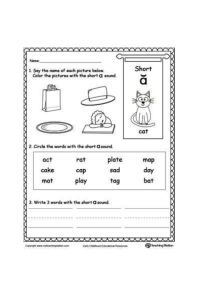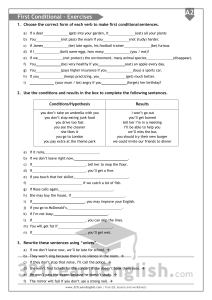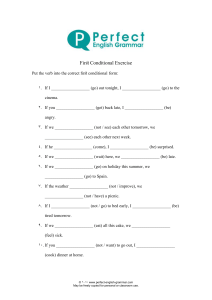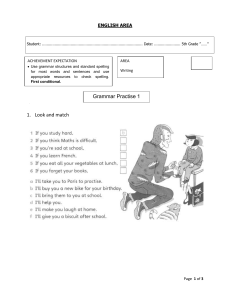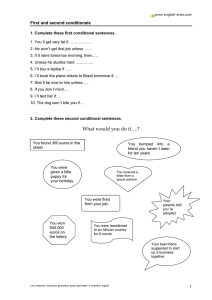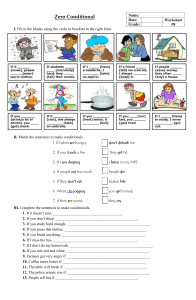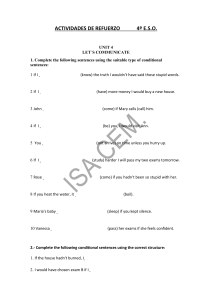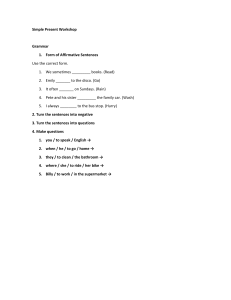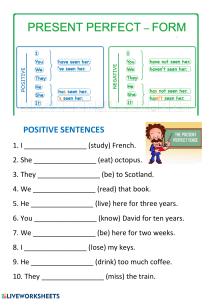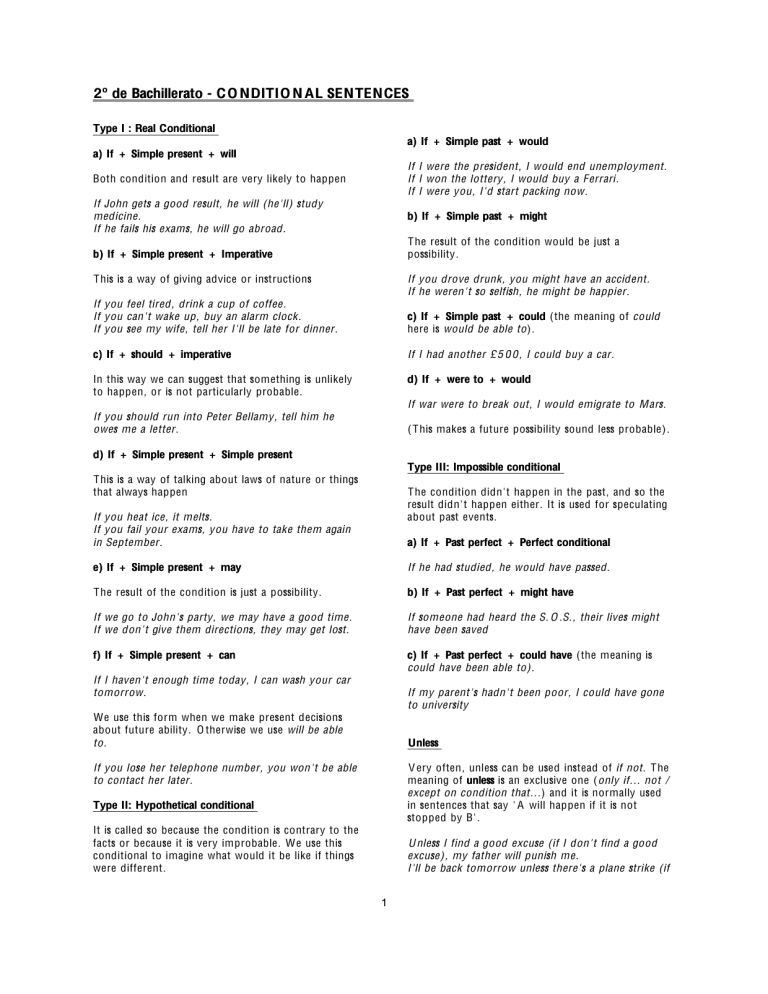
2º de Bachillerato - C O NDITIO N AL SENTENCES Type I : Real Conditional a) If + Simple past + would a) If + Simple present + will If I were the president, I would end unemployment. If I won the lottery, I would buy a Ferrari. If I were you, I'd start packing now. Both condition and result are very likely to happen If John gets a good result, he will (he'll) study medicine. If he fails his exams, he will go abroad. b) If + Simple past + might The result of the condition would be just a possibility. b) If + Simple present + Imperative If you drove drunk, you might have an accident. If he weren't so selfish, he might be happier. This is a way of giving advice or instructions If you feel tired, drink a cup of coffee. If you can't wake up, buy an alarm clock. If you see my wife, tell her I'll be late for dinner. c) If + Simple past + could (the meaning of could here is would be able to ). c) If + should + imperative If I had another £ 5 0 0 , I could buy a car. In this way we can suggest that something is unlikely to happen, or is not particularly probable. d) If + were to + would If war were to break out, I would emigrate to Mars. If you should run into Peter Bellamy, tell him he owes me a letter. ( This makes a future possibility sound less probable). d) If + Simple present + Simple present Type III: Impossible conditional This is a way of talking about laws of nature or things that always happen The condition didn't happen in the past, and so the result didn't happen either. It is used for speculating about past events. If you heat ice, it melts. If you fail your exams, you have to take them again in September. a) If + Past perfect + Perfect conditional e) If + Simple present + may If he had studied, he would have passed. The result of the condition is just a possibility. b) If + Past perfect + might have If we go to John's party, we may have a good time. If we don't give them directions, they may get lost. If someone had heard the S . O . S ., their lives might have been saved f) If + Simple present + can c) If + Past perfect + could have (the meaning is could have been able to). If I haven't enough time today, I can wash your car tomorrow. If my parent's hadn't been poor, I could have gone to university We use this form when we make present decisions about future ability. O therwise we use will be able to. Unless If you lose her telephone number, you won't be able to contact her later. V ery often, unless can be used instead of if not . The meaning of unless is an exclusive one ( only if... not / except on condition that... ) and it is normally used in sentences that say ' A will happen if it is not stopped by B'. Type II: Hypothetical conditional It is called so because the condition is contrary to the facts or because it is very improbable. We use this conditional to imagine what would it be like if things were different. U nless I find a good excuse (if I don't find a good excuse), my father will punish me. I'll be back tomorrow unless there's a plane strike (if 1 there isn't a plane strike). Let's have dinner out unless you're too tired (if you aren't too tired). CONDITIONAL SENTENCES: EXERCISES 1) Change these conditional sentences type I into type II and type III. 1.- If you give me some glue, I will stick the pieces together. 2.- I will get you a newspaper if I can find one. 3.- He will be a good president if he is elected. 4.- There will be more people killed if we don't stop that war. 5.- If you hurry, you'll catch your train. 6.- If you are a good boy, I will take you to the cinema. H owever, unless cannot be used in sentences that say ' A will result from B not happening.' Compare: I will be glad if she doesn't come this evening. *I will be glad unless she comes this evening. I will be surprised if she doesn't have an accident. *I will be surprised unless she has an accident. Notice The main clause can come first and the if clause second, especially in questions. What will he do if he fails his exams? 2) Rephrase the following sentences into conditionals (types I, II or III) like in the example: e.g. You were not at home yesterday. Your little brother had an accident (type III) = If you had been at home yesterday, your little brother wouldn't have had an accident. 1.- I forgot the car keys at home. I was late for work. (t. III). 2.- She hasn't got a university degree. She'd like to have a better job. (t. II) 3.- I spent all my money on cigarettes. I need a dictionary. (t. III). 4.- You might see my sister. I need to tell her that our father's gone on a business trip. (t. I, use SHOULD). 5.- Susan is going to fail almost every subject this year. She wants to go to university. (t. I) 6.- He's not handsome. He'd like to have a beautiful girlfriend. (type II, use MIGHT in the main clause). 7.- The prison warder was having lunch. The prisoners escaped. (t.III). 8.- I need a typewriter. It costs a lot of money. (t. I) 9.- I don't have enough time. I like reading very much. (t. II) 10.- I don't like cooking. I always eat in restaurants (t. II) Inversion in conditional sentences In literary style, we can sometimes omit if changing the word order subject / auxiliary. This has nothing to do, of course, with an interrogative sentence. If you should run into Peter Bellamy, tell him he owes me a letter. = Should you run into Peter Bellamy... If she were my daughter, I would send her to a boarding school. = Were she my daughter... If war were to break out, I would emigrate to Mars. = Were war to break out... If he had studied, he would have passed. = Had he studied.. . 4. Other words with conditional meaning M any words and expressions can be used with a meaning similar to if, (and with similar verb forms). Some of the commonest are provided, providing, providing, supposing, as long as, on condition that. Supposing you fell in love with your boss, what would you do? You can borrow my bike provided/providing you bring it back. I'll give you the day off on condition that you work on Saturday morning. You are welcome to stay with us, as long as you share the rent. 3) CONDITIONAL SENTENCES TYPE I: basic forms Write conditional sentences type I, using the given facts in your conditional clause, and adding a suitable completion, e.g. He's thinking of going to England. If he goes to England, he will have to learn English. 1.- It looks as if those shoes in the window are my size. 2.- Don't drop that vase. 3.- It looks like being fine tomorrow. 4.- My father has suggested that I change my job. 5.- It seems that we'll be late for the theatre. 6.- Don't lose my library book! 7.- You may meet some friends of mine in London. 8.- He expects to pass his exams. 9.- They're hoping it will be a baby boy. 2 10.- I anticipate getting a rise in salary next year. constant balance of payments problem. 5.- Since I know the meaning of the word, I don't have to look it up. 6.- This exercise is easy, so everyone will get the correct answers. 7.- I know the answer so I can tell you. 8.- We haven't any matches so we can't light the fire. 4) CONDITIONAL SENTENCES TYPE I: present + present Answer these questions like in the example: What happens if you heat ice? If you heat ice, it melts. 1.- What happens if flowers don't get any water? 2.- What must a motorist do if the traffic lights are red? 3.- What materials do you need if you want to write a letter? (you = one) 4.- What do you like to drink if you are thirsty? (you = you) 5.- Who do businessmen go to see if the want to borrow money? 6.- What do you expect a teacher to do if you make a mistake? 7.- What must one have if one wants to visit a foreign country? 8.- Who do people go to see if they feel ill? 9.- What happens if there is a power failure? 10.- How do people dress in your country if they work in an office? 7) CONDITIONAL SENTENCES TYPE III. Complete the sentences, following one of the patterns of conditional sentences type III. 1.- I would have enjoyed the party much more if... 2.- It ... if the sea hadn't been so rough. 3.- Would you have been able to come next Tuesday if...? 4.- If you had taken my advice... 5.- If I had realized that you were really serious in what you said,... 6.- If it hadn't been for the fact that his father has influence... 7.- If he were to have told me the truth in the first place... 8.- Would you have lent him the money if...? 9.- What difference would it have made, even if...? 10.- If the fire brigade had arrived but a quarter of an hour earlier,... 11.- I'm sure she wouldn't have married him if... 12.- If..., we would have left without them. 5) CONDITIONAL SENTENCES TYPE II: Answer the questions with conditional statements of Type II. 1.- What cities or other places of interest would you visit if you went to America? 2.- What would you do (or not do) if you could live your life over again? 3.- What would you say or do if someone called you a fool? 4.- If a visitor came to your town, what places would you advise him to see? 5.- What famous person would you like to meet if you had the chance? 6.- What country would you choose if you decided to live abroad? 7.- What changes would you make in your house, assuming you had the money? 8.- What would you do if you saw a house on fire? 9.- What would you do if you had something stolen? 10.- Which books or records would you take with you if you went to live on a desert island? 8) CONDITIONAL SENTENCES TYPE III Change the following sentences into conditionals type III like in the example: He didn't know his wife was going to be sitting at the next table, and so he took his secretary to the Golden Tower restaurant = If he had known his wife was going to be sitting at the next table, he wouldn't have taken his secretary to the Golden Tower restaurant. 1.- Bob didn't hear about it in time, and so he didn't join Oliver's expedition to Afghanistan. 2.- She changed her nationality on marriage, and so he didn't need to have her visa extended. 3.- The Hotchkisses ran out of marmalade, and so they had apricot jam this morning. 4.- I didn't know Oswald was going to be present, and so I went there. 5.- Guy didn't tell Hazel about the girl he met at the party, and so Hazel wasn't annoyed. 6.- I had nothing better to do, and so I turned on the television to watch this infantile rubbish. 7.- Wilfred was suddenly taken ill, and so he and his family didn't go on holiday to Greece. 8.- Miranda didn't see that the customer was going out without paying, and so she didn't rush out and stop her. 9.- Slasher Higgins was carrying a gun when they caught him, and so he didn't get a shorter sentence. 6) CONDITIONAL SENTENCES TYPE II. Write conditional sentences type III based on the given facts. We don't have any wood, so we can't light a fire. If we had some wood, we could light a fire. 1.- Since she doesn't love him, she won't marry him. 2.- Our teacher explains things clearly, so we understand his lessons. 3.- As I haven't a watch, I can't tell you the time. 4.- Britain doesn't export enough, so she has a 3 10.- Nobody told me it was your birthday, and so I asked you to clean out the larder. 11.- Percy was playing the fool all day, and so we didn't get more work done. 12.- Mr Gibson didn't marry the girl he loved thirty years ago, and so he wasn't a happier man. 13.- There was no chance of rescuing survivors, and so they called off the search. 14.- He started running a bath and then forgot about it, and so the water overflowed, and we had all this trouble and expense. 15.- He listened at the door of the boardroom, and in that way he learned that he was going to lose his job. were thirsty. 28.- If you had touched that electric cable you (be) electrocuted. 29.- If the story hadn't been true the newspaper (not print) it. 30.- I (not buy) things on the instalment system if I were you. 31.- Dial 999 if you (want) Police, Ambulance, or Fire Brigade, 32.- You (not be) any use to me unless you learn to type. 33.- If anyone attacked me, my dog (jump) at his throat. 34.- If he were in he (answer) the phone. 35.- The ship would have run aground if the pilot (make) one mistake. 36.- I shouldn't have taken your umbrella if I (know) that it was the only one you had. 9) CONDITIONAL SENTENCES: MIXED TYPES. Put the verbs in brackets into the correct tenses: 1.- If you (find) a skeleton in the cellar don't mention it to anyone. 2.- If you pass your examination we (have) a celebration. 3.- What (happen) if I press this button? 4.- I should have voted for her if I (have) a vote then. 5.- If you go to Paris where you (stay)? 6.- If someone offered to buy you one of those rings, which you (choose)? 7.- The flight may be cancelled if the fog (get) thicker. 8.- If the milkman (come) tell him to leave two pints. 9.- Someone (sit) on your glasses if you leave them there. 10.- You would play better bridge if you (not talk) so much. 11.- What I (do) if I hear the burglar alarm? 12.- If you (read) the instructions carefully you wouldn't have answered the wrong question. 13.- I could repair the roof myself if I (have) a long ladder. 14.- Unless the turn the radio off I (go) mad. 15.- If you were made redundant what you (do)? 16.- We'll have a long way to walk if we (run) out of petrol here. 17.- If you shake that bottle of port it (not be) fit to drink. 18.- I'll probably get lost unless he (come) with me. 19.- You (not have) so many accidents if you drove more slowly. 20.- If you (wear) a false beard nobody would have recognized you. 21.- If she (leave) the fish there the cat will get it 22.- Unless they leave a lamp beside that hole in the road somebody (fall) into it. 23.- You'll get pneumonia if you (not change) your wet clothes. 24.- If I had known that you couldn't eat octopus I (not buy) it. 25.- If they (hang) that picture lower people would be able to see it. 26.- She (be able) to walk faster if her shoes hadn't such high heels. 27.- I (bring) you some beer if I had known that you 10) CONDITIONAL SENTENCES: mixed types. Finish these sentences, taking care to use correct tenses. 1.- If he had taken my advice... 2.- If you ate less... 3.- We'll send for the doctor if... 4.- If she practised more... 5.- If there isn't enough wine in that bottle... 6.- If you had checked the petrol before we started... 7.- This clock wouldn't have run down if... 8.- Try on the blue one if... 9.- If these gates are locked... 10.- If we leave before breakfast... 11.- If the river rises any higher... 12.- Her life might have been saved if... 13.- If the volcano starts erupting... 14.- The glass would look better if... 15.- Unless it is a nice day... 16.- If you don't put enough stamps on the letter, the person who gets it... 17.- He would lend it to you if... 18.- Unless this hotel gets another cook... 19.- If the storm becomes worse... 20.- If your uncle sees you... 21.- If you tried to climb it without a guide... 22.- If you didn't shake the camera so much, your photographs... 23.- I'd have brought my coat... 24.- If you don't like the picture... 25.- He would have given her diamonds... 26.- If you had asked his permission... 27.- If the fire had been noticed earlier... 28.- If you had any sense... 29.- You would have been angry if... 30.- If he had put the flowers into water at once... 31.- I should have ordered more coal if... 32.- If you leave the gate open... 4 oct2012.pdf GrammarNet.com Gramática da Língua Inglesa Exercício do Mês Intermediate - Advanced October 2012 Wish / If only Complete each of the sentences in such a way that it means the same as the sentence before it. 1. I didn't do the homework. If only I …………………… the homework. 2. They have committed a crime and now they have to face justice. They wish they …………………… a crime. 3. This kid is so stubborn. I wish this kid …………………… so stubborn. 4. He never does any household chores. I'm sick and tired of it. I wish he …………………… some household chores. 5. Jason doesn't pay much attention in class. If only Jason …………………… more attention in class. 6. Why doesn't he stop smoking? There are other people in the room who don't smoke. If only he …………………… smoking. 7. I've got a splitting headache. I wish I …………………… a splitting headache. 8. He signed the contract without reading the small print. He wishes he …………………… the small print before signing the contract. 9. Steve didn't propose to Isabel when he should have. Now Isabel is in Australia. Steve wishes he …………………… to Isabel earlier. 10. She was told off because she didn't do what her mother had asked her. She wishes she …………………… what her mother had asked her. 11. He always belches loudly after eating. It's such a disgusting habit. I wish he …………………… loudly after eating. 12. She didn't heed my warnings. That's why she lost everything. If only she …………………… my warnings. 12 © E.S.Ping 2012 1 of 2 oct2012.pdf oct2012.pdf GrammarNet.com Gramática da Língua Inglesa Exercício do Mês Intermediate - Advanced October 2012 Wish / If only Complete each of the sentences in such a way that it means the same as the sentence before it. 1. I didn't do the homework. If only I had done the homework. 2. They have committed a crime and now they have to face justice. They wish they hadn't committed a crime. 3. This kid is so stubborn. I wish this kid weren't so stubborn. 4. He never does any household chores. I'm sick and tired of it. I wish he would do some household chores. 5. Jason doesn't pay much attention in class. If only Jason paid more attention in class. 6. Why doesn't he stop smoking? There are other people in the room who don't smoke. If only he would stop smoking. 7. I've got a splitting headache. I wish I didn't have a splitting headache. 8. He signed the contract without reading the small print. He wishes he had read the small print before signing the contract. 9. Steve didn't propose to Isabel when he should have. Now Isabel is in Australia. Steve wishes he had proposed to Isabel earlier. 10. She was told off because she didn't do what her mother had asked her. She wishes she had done what her mother had asked her. 11. He always belches loudly after eating. It's such a disgusting habit. I wish he wouldn't belch loudly after eating. 12. She didn't heed my warnings. That's why she lost everything. If only she had heeded my warnings. © E.S.Ping 2012 2 of 2 oct2012.pdf ENGLISH GRAMMAR Reported Speech REPORTED SPEECH DIRECT AND INDIRECT (OR REPORTED) SPEECH. INTRODUCTION There are two ways of relating what a person has said: direct and indirect. In direct speech we repeat the original speaker’s exact words: He said, “I have lost my umbrella.” Remarks thus repeated are placed between inverted commas, and a comma is placed immediately before the remark. Direct speech is found in conversations in books, in plays and in quotations. In indirect speech we give the exact meaning of a remark or a speech, without necessarily using the speaker’s exact words: He said (that) he had lost his umbrella. There is no comma after say in indirect speech. that can usually be omitted after say and tell + object. But it should be kept after other verbs: complain, explain, object, point out, protest etc. Indirect speech is normally used when conversation is reported verbally, though direct speech is sometimes here to give a more dramatic effect. When we turn direct speech into indirect, some changes are usually necessary. PRONOUNS AND ADJECTIVES: CHANGES NECESSARY A. First and second person pronouns and possessive adjectives normally change to the third person except when the speaker is reporting his own words. (I = he, she; me = him, her; my = his, her; mine = his, hers; we = they...) She said, “he’s my son”. She said that he was her son. “I’m ill”, she said. She said that she was ill. B. THIS / THESE This used in time expressions usually becomes that. 1 She said, “She’s coming this week”. She said that she was coming that week. This and that used as adjectives usually change to the. He said, “I bought this pearl/these pearls for my mother”. He said that he had bought the pearl/the pearls for his mother. This, these used as pronouns can become it, they/them. He came back with two knives and said, “I found these beside the king’s bed”. He said he had found them beside the king’s bed. He said, “We will discuss this tomorrow”. He said that they would discuss it (the matter) the next day. EXPRESSIONS OF TIME AND PLACE IN INDIRECT SPEECH A. Adverbs and adverbial phrases of time change as follows: DIRECT SPEECH today yesterday the day before yesterday tomorrow the day after tomorrow next week/year etc. last week/year etc. a year etc. ago INDIRECT SPEECH that day the day before two days before the next day/the following day in two day’s time the following week/year etc. the previous week/year etc. a year before/the previous year “I saw her the day before yesterday”, he said. He said he’d seen her two days before. “I’ll do it tomorrow”, he promised. He promised that he would do it the next day. She said, “My father died a year ago”. She said that her father had died a year before/the previous year. B. But if the speech is made and reported on the same day these time changes are not necessary: At breakfast this morning he said, “I’ll be very busy today”. At breakfast this morning he said that he would be very busy today. C. here can become there but only when it is clear what place is meant: At the station he said, “I’ll be here again tomorrow”. He said that he’d be there again the next day. Usually here has to be replaced by some phrase: She said, “You can sit here, Tom”. She told Tom that he could sit beside her. STATEMENTS IN INDIRECT SPEECH: TENSE CHANGES NECESSARY A. Indirect speech can be introduced by a verb in a present tense: He says that ... This is usual when we are: a. reporting a conversation that is still going on b. reading a letter and reporting what it says c. reading instructions and reporting them d. reporting a statement that someone makes very often, e.g. Tom says that he’ll never get married. When the introductory verb is in a present, present perfect or future tense we can report the direct speech without any change of tense: 2 PAUL (phoning from the station): I’m trying to get a taxi. ANN (to Mary, who is standing beside her): Paul says he is trying to get a taxi. B. But indirect speech is usually introduced by a verb in the past tense. Verbs in the direct speech have then to be changed into a corresponding past tense. The changes are shown in the following table. DIRECT SPEECH INDIRECT SPEECH Simple Present “I never eat meat”, he explained. Present Continuous “I’m waiting for Ann”, he said. Present Perfect “I have found a flat”, he said. Present Perfect Continuous He said, “I’ve been waiting for ages”. Simple Past “I took it home with me”, she said. Future He said, “I will/shall be in Paris on Monday”. Future Continuous “I will/shall be using the car myself on the 24h”, she said. Conditional I said, “I would like to see it”. Simple Past = He explained (that) he never ate meat. Past Continuous = He said (that) he was waiting for Ann. Past Perfect = He said (that) he had found a flat. Past Perfect Continuous = He said (that) he had been waiting for ages. Past Perfect = She said (that) he had taken it home with her. Conditional = He said (that) he would be in Paris on Monday. Conditional Continuous = She said (that) she’d been using the car herself on the 24th. Conditional = I said (that) I would like to see it. ENGLISH GRAMMAR Reported Speech All those changes represent the distancing effect of the reported speech. Common sense, together with the time aspect from the speaker’s point of view, are more important than the rules when making the usual changes. QUESTIONS IN INDIRECT SPEECH Direct question: He said, “Where is she going?” Indirect question: He asked where she was going. A. When we turn direct questions into indirect speech, the following changes are necessary: a. tenses, pronouns and possessive adjectives, and adverbs of time and place change as in statements. b. the interrogative form of the verb changes to the affirmative form. c. the question mark is omitted in indirect questions. B. If the introductory verb is say, it must be changed to a verb of inquiry, e.g. ask, wonder, want to know etc. He said, “Where is the station?” He asked where the station was. C. ask can be followed by the person addressed (indirect object): He asked, “What have you got in your bag?” He asked (me) what I had got in my bag. But wonder and want to know cannot take an indirect object, so if we wish to report a question where the person addressed is mentioned, we must use ask. He said, ”Mary, when is the next train?” He asked Mary when the next train was. D. If the direct question begins with a question word (when, where, who, how, why etc.) the question word is repeated in the indirect question: He said, “Why didn’t you put on the brake?” He asked (her) why she hadn’t put on the brake. She said, “What do you want?” She asked (them) what they wanted. 3 E. If there is no question word, if or whether must be used: “Is anyone there?” he asked He asked if/whether anyone was there. COMMANDS, REQUESTS, ADVICE IN INDIRECT SPEECH Direct command: He said, “Lie down, Tom”. Indirect command: He told Tom to lie down. Indirect commands, requests, advice are usually expressed by a verb of command/request/advice + object + infinitive. A. The following verbs can be used: advise, ask, beg, command, order, remind, tell, warn etc. He said, “Get your coat, Tom!” He told Tom to get his coat. B. Negative commands, requests etc. are usually reported by not + infinitive: “Don’t swim out too far, boys”, I said I warned/told the boys not to swim out too far. EXCLAMATIONS IN INDIRECT SPEECH Exclamations usually become statements in indirect speech. The exclamation mark disappears. a. Exclamations beginning What (a) ... or How ... can be reported by: - exclaim/say that: He said, “What a dreadful idea!” or “How dreadful!” He exclaimed that it was a dreadful idea/was dreadful. - give an exclamation of delight/disgust/horror/relief/surprise etc. - if the exclamation is followed by an action we can use the construction with an exclamation of delight/disgust etc. + he/she etc. + verb. b. Other types of exclamation such as Good! Marvellous! Splendid! Heavens! Oh! Ugh! etc. can be reported as in (b) or (c) above: “Good!” he exclaimed. He gave an exclamation of pleasure/satisfaction. “Ugh!” she exclaimed, and turned the programme off. With an exclamation of disgust she turned the programme off. c. Note also: He said, “Thank you!” He thanked me. He said, “Good luck!” He wished me luck. He said, “Happy Christmas!” He wished me a happy Christmas. He said, “Congratulations!” He congratulated me. He said, “Liar!” He called me a liar. He said, “Damn!” etc. He swore. The notice said: WELCOME TO WALES! The notice welcomed visitors to Wales. YES AND NO IN INDIRECT SPEECH yes and no are expressed in indirect speech by subject + appropriate auxiliary verb. He said, “Can you swim?” and I said “No” He asked (me) if I could swim and I said I couldn’t. He said, “Will you have time to do it?” and I said “Yes” He asked if I would have time to do it and I said that I would. OFFERS AND SUGGESTIONS IN INDIRECT SPEECH A. OFFERS “Shall I bring you some tea?” could be reported He offered to bring me some tea. 4 B. SUGGESTIONS “Shall we meet at the theatre? could be reported He suggested meeting at the theatre. INDIRECT SPEECH: MIXED TYPES Direct speech may consist of statement + question, question + command, command + statement, or all three together. Normally each requires its own introductory verb. “I don’t know the way. Do you?” he asked. He said he didn’t know the way and asked her if she did/if she knew it. He said, “Someone is coming. Get behind the screen.” He said that someone was coming and told me to get behind the screen. REPORTED SPEECH: OTHER POINTS A. MUST: after a past reporting verb, must does not usually change: He said, “It must be pretty late, I really must go”. He said that it must be pretty late and he really must go. had to is also possible in reported speech, but this is really the past of have to, not must. He said, “I have to go. I have an appointment in half an hour” He said that he had to go because he had an appointment in half an hour. B. MODAL VERBS: Past modal verbs (could, might, ought to, should, used to, etc. ) do not normally change in reported speech. He said, “I might come”. He said that he might come. He said, “I would help him if I could”. He said that he would help him if he could. He said, “You needn’t wait”. He said that I needn’t wait. ENGLISH GRAMMAR Reported Speech C. CONDITIONALS: Conditional sentences type two remain unchanged. He said, “If my children were older I would that if his children were older he would emigrate. emigrate”. He said SAY AND TELL AS INTRODUCTORY VERBS A. say and tell with direct speech. 1. say can introduce a statement or follow it. Tom said, “I’ve just heard the news”. or “I’ve just heard the news”,Tom said. Inversion of say and noun subject is possible when say follows the statement. “I’ve just heard the news”, said Tom. say + to + person addressed is possible, but this phrase must follow the direct statement; it cannot introduce it. “I’m leaving at once”, Tom said to me. Inversion is not possible here. 2. tell requires the person addressed. Tell me. He told us. I’ll tell Tom. Except with tell lies/stories/the truth/the time, when the person addressed need not to be mentioned. He told (me) lies. I’ll tell (you) a story. Tell used with direct speech must be placed after the direct statement: “I’m leaving at once”, Tom told me. Inversion is not possible with tell. B. say and tell with indirect speech Indirect statements are normally introduced by say, or tell + object. Say + to + object is possible but less usual than tell + object. He said he’d just heard the news. 5 He told me that he’d just heard the news. Note also tell ... how/about: He told us how he had crossed the mountains. He told us about crossing the mountains. He told us about his journeys. BIBLIOGRAPHY - A. J. Thomson and A.V. Martinet, A Practical English Grammar, Oxford University Press, 1986 - R. Fernández Carmona, English Grammar… with exercises, Longman, 2000 - R. Murphy, English Grammar in Use, Cambridge University Press 1990 - M. Harrison, Grammar Spectrum 2, Oxford University Press, 1996 - N. Coe, Grammar Spectrum 3, Oxford University Press, 1996 EXERCISES STATEMENTS 1. These people are saying these things. Report them, using says that. a. Paul: “Atlanta is a wonderful city.” ____________________________________________________ b. Ruth: “I go jogging every morning.” ___________________________________________________ c. Anna: “Jenny isn’t studying for her exams.” _____________________________________________ d. Andrew: “I used to be very fat.” _______________________________________________________ e. e.- Jim: “I can’t swim.” ______________________________________________________________ 2. People made these statements. Report them, using said. a. “Mary works in a bank”, Jane said. ____________________________________________________ b. “I’m staying with some friends”, Jim said. _______________________________________________ c. “I’ve never been to Russia”, Mike said. _________________________________________________ d. “Tom can’t use a computer”, Ella said. _________________________________________________ e. “Everybody must try to do their best”, Jill said. __________________________________________ f. “Jane may move to a new flat”, Rachel said. ____________________________________________ g. “I’ll stay at home on Sunday”, Bill said. _________________________________________________ 3. Report what the guests said at a wedding last Sunday. a. Miss Moore: “They’ll make a lovely couple.” _____________________________________________ b. Mr Smith: “They’re going to live in Brighton.” ____________________________________________ c. Mrs Jones: “The bride and the groom are very nice young people.” __________________________ _________________________________________________________________________________ d. Mr Roberts: “The bride is wearing a beautiful wedding dress.” ______________________________ _________________________________________________________________________________ e. Mr Clarke: “The couple’s parents look happy.” ___________________________________________ f. Miss Mayall: “The bride’s father has bought them a big flat.” _______________________________ _________________________________________________________________________________ 4. Change the following statements into the reported speech. a. “I have something to show you”, I said to her. _________________________________________________________________________________ b. “I’m going away tomorrow”, he said. 6 _________________________________________________________________________________ c. “I’ve been in London for a month but I haven’t had time to visit the Tower”, said Rupert. _________________________________________________________________________________ d. “I’ll come with you as soon as I’m ready”, she replied. _________________________________________________________________________________ e. “We have a lift but very often it doesn’t work”, they said. _________________________________________________________________________________ f. “I must go to the dentist tomorrow”, he said. _________________________________________________________________________________ g. “I found an old Roman coin in the garden yesterday and I am going to take it to the museum this afternoon”, he said. _________________________________________________________________________________ 5. Write these sentences in indirect speech. a. “I’m very tired”, she said. ____________________________________________________________ b. “I’ll see them soon”, he said. _________________________________________________________ c. “I’m going to the cinema”, she said. ___________________________________________________ d. “I see the children quite often”, he said. ________________________________________________ e. “I’m having a bath”, she said. _________________________________________________________ f. “I’ve already met their parents”, she said. _______________________________________________ g. “I stayed in a hotel for a few weeks”, she said. ___________________________________________ h. “I must go home to make dinner”, he said. ______________________________________________ i. “I haven’t been waiting long”, she said. _________________________________________________ j. “I’m listening to the radio”, he said. ____________________________________________________ k. “I’ll tell them the news on Saturday”, she said. ___________________________________________ l. “I like swimming, dancing and playing tennis”, he said. ____________________________________ _________________________________________________________________________________ ENGLISH GRAMMAR Reported Speech m. n. o. p. q. r. s. t. “I can drive”, she said. ______________________________________________________________ “I walked home after the party”, he said. _______________________________________________ “I’m going to be sick”, she said. _______________________________________________________ “I must go out to post a letter”, he said. ________________________________________________ “I spoke to Jane last week”, she said. ___________________________________________________ “I’m trying to listen to the music”, he said. ______________________________________________ “I’ll phone the office from the airport”, she said. _________________________________________ “I can’t speak any foreign languages”, he said. ___________________________________________ 6. Write these sentences in indirect speech, changing words where necessary. a. “I’ll see you tomorrow”, she said. _________________________________________________________________________________ b. “I saw her today”, he said. _________________________________________________________________________________ c. “I don’t like this film”, she said. _________________________________________________________________________________ d. She said, “We went swimming today.” _________________________________________________________________________________ e. “I met her about three months ago”, he said. _________________________________________________________________________________ f. “I’ll see Mary on Sunday”, she said. _________________________________________________________________________________ g. “Pete and Sue are getting married tomorrow”, she said. _________________________________________________________________________________ h. “Stephen’s bringing some records to the party tomorrow”, she said. _________________________________________________________________________________ 7 i. “I really like this furniture”, she said. _________________________________________________________________________________ j. “My parents are arriving tomorrow”, she said. _________________________________________________________________________________ k. “We visited her this morning” they said. _________________________________________________________________________________ l. “We’ll see her next summer” they said. _________________________________________________________________________________ m. “They were here three months ago”, he said. _________________________________________________________________________________ n. “I’m meeting them at four o’clock today”, he said. _________________________________________________________________________________ o. “I can see you tomorrow”, she said. _________________________________________________________________________________ QUESTIONS 7. Report the police-officer’s questions to the shop owner. a. What’s your name? _________________________________________________________________ b. Did you see the robbers? ____________________________________________________________ c. What were they wearing? ___________________________________________________________ d. How do you think they got in? ________________________________________________________ e. What did they take? ________________________________________________________________ f. Has this ever happened before? ______________________________________________________ 8. Write these sentences as reported questions using the words given. a. “What’s your name?”, he asked. (wanted to know) _________________________________________________________________________________ b. “Do you like Marlon Brandon?”, she asked. _________________________________________________________________________________ c. “How old are you?”, she said. (asked) _________________________________________________________________________________ d. “When does the train leave?”, I asked. _________________________________________________________________________________ e. “Are you enjoying yourself?”, he asked. _________________________________________________________________________________ f. “How are you?”, he said. (asked) _________________________________________________________________________________ g. “Does your father work here?”, she asked. _________________________________________________________________________________ h. “Do you live near your father?”, he asked. _________________________________________________________________________________ i. “Who did you see at the meeting?”, my mother asked. _________________________________________________________________________________ j. “Why did you take my wallet?”, he asked. _________________________________________________________________________________ k. “How did you get to school?”, she asked. 8 _________________________________________________________________________________ l. “Are you a foreigner?”, she asked. _________________________________________________________________________________ m. “Where do you live?”, the boy asked. _________________________________________________________________________________ n. “Have you met Danny before?”, he asked. _________________________________________________________________________________ o. “Are you hungry?”, he asked. _________________________________________________________________________________ p. “Why wasn’t Judy at the party?”, she asked. _________________________________________________________________________________ q. “Why didn’t you telephone?”, my father asked. _________________________________________________________________________________ r. “Did you borrow my dictionary?”, he asked. _________________________________________________________________________________ s. “Why are you so late?”, the teacher asked. _________________________________________________________________________________ t. “Have you finished your exams?”, she asked. _________________________________________________________________________________ u. “Did you invite Judy and Mitch?”, he asked. _________________________________________________________________________________ v. “Does your brother live in London?”, she asked. _________________________________________________________________________________ w. “Why didn’t the police report the crime?”, the judge asked. _________________________________________________________________________________ x. “Do you know who broke the window?”, he asked. _________________________________________________________________________________ ENGLISH GRAMMAR Reported Speech y. “Why you won’t let me in?”, he shouted. _________________________________________________________________________________ COMMANDS, REQUESTS AND ADVICE 9. Rewrite these sentences in reported speech. a. “Make some coffee, Bob”, Carol said.(ask) _________________________________________________________________________________ b. “You must do the homework soon, Jane”, she said.(tell) _________________________________________________________________________________ c. “Remember to buy a map, Ann” he said.(remind) _________________________________________________________________________________ d. “You should see a doctor, Mrs Clark”, he said.(advise) _________________________________________________________________________________ e. “Keep all the windows closed, Bill” they said.(warn) _________________________________________________________________________________ f. “Go home, Paul”, Francis said.(tell) _________________________________________________________________________________ g. “Please stay for supper, Bob”, he said.(try to persuade) _________________________________________________________________________________ 10. Report the following sentences. a. “Don’t try to be funny.” _________________________________________________________________________________ b. “Wait here till I come.” _________________________________________________________________________________ c. “Go to bed and don’t get up till you’re called.” 9 _________________________________________________________________________________ d. “Be a good girl and sit quietly for five minutes.” _________________________________________________________________________________ e. “Watch the milk and don’t let it boil over.” _________________________________________________________________________________ f. “Don’t take your coat off.” _________________________________________________________________________________ g. “Don’t forget to thank Mrs Jones when you’re saying good bye to her.” _________________________________________________________________________________ h. “Stop that dog.” _________________________________________________________________________________ 11. Write the sentences in reported speech using the words given. a. “Sit down, Mary.” (he told) _________________________________________________________________________________ b. “Would you pass my suitcase?” (he asked) _________________________________________________________________________________ c. “Don’t go near the sea, children.” (the children’s mother warned) _________________________________________________________________________________ d. “Don’t be late, Tim.” (Tim’s father told) _________________________________________________________________________________ e. “Be quiet, children.” (the librarian told) _________________________________________________________________________________ f. “Have your tickets ready, please.” (the inspector told us) _________________________________________________________________________________ SAY AND TELL 12. Use the correct form of SAY and TELL in these sentences. a. She _______________________ me she didn’t agree. b. He _______________________ , “Have we met before?” c. I _______________________ them I wasn’t happy with their work. d. She smiled and _______________________ to me, “I’m very pleased to meet you.” e. She _______________________ me a story about her parents. f. He _______________________, “Are you feeling OK?” g. I didn’t hear. What did he _______________________? h. Could you _______________________ me the time, please? i. They _______________________ me they were going to a meeting. j. I _______________________ the police my address. k. I _______________________ I wanted to buy a magazine. l. He _______________________ he wasn’t interested in politics. m. Could you _______________________ me your name again? n. Do you think he is _______________________ the truth? o. Would you _______________________ him to come early tomorrow? p. If he _______________________ that again there’ll be trouble. q. I _______________________ them it was dangerous to swim here. r. Did you _______________________ anything to him about your problem at work? 10 s. _______________________ me what happened. t. I think he is _______________________ lies. u. The policeman _______________________ the man was lying. v. Philip _______________________ it would probably rain tomorrow. w. Susan _______________________, “Let’s go out for dinner tonight.” x. Jim _______________________ me about the party last night. y. Our teacher _______________________ he was pleased with our work. z. Stop _______________________ lies! OFFERS AND SUGGESTIONS 13. Rewrite the sentences with the gerund or the infinitive and the in reported speech. a. “I’ll bring my CDs to the party.” He promised to bring his CDs to the party. b. “Let’s go to the cinema tonight, shall we? She suggested _____________________________________________________________________ c. “Yes, I stole the wallet.” He admitted ______________________________________________________________________ d. “Be careful! The water is boiling.” She warned us _____________________________________________________________________ e. “You must apologise to your teacher.” My father insisted (on) ______________________________________________________________ f. “All right! I’ll share the expenses with you.” My friend agreed ___________________________________________________________________
